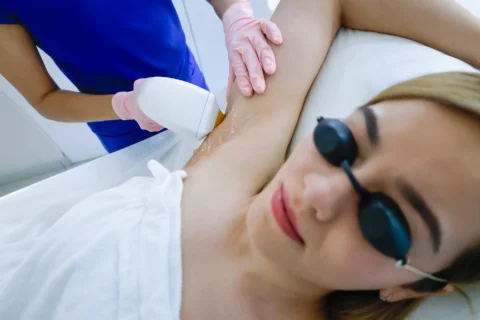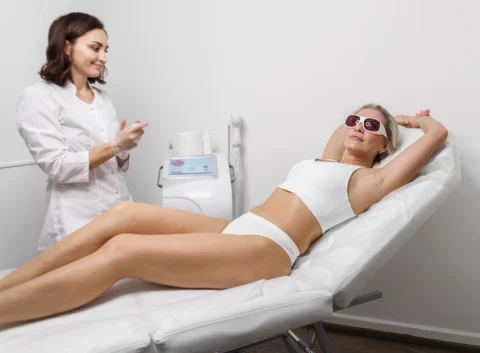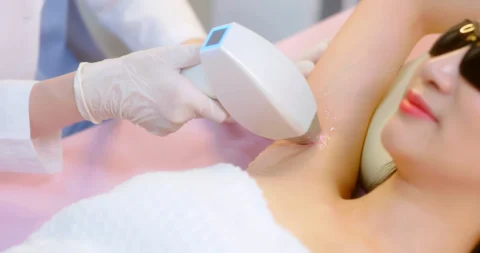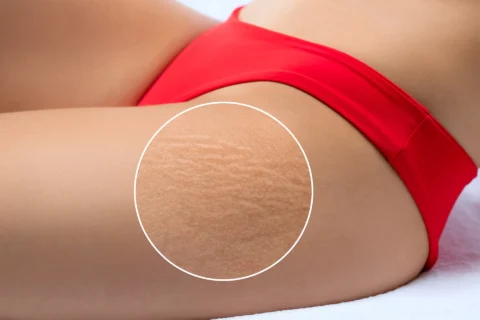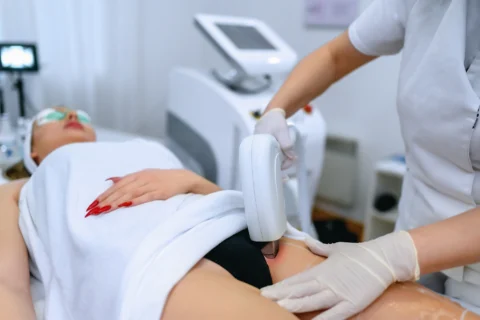Many patients anticipate the magic of immediate hair disappearance following a laser hair removal session. However, the truth is different: your unwanted hair won’t vanish overnight after laser treatment.
In this comprehensive guide, we shed light on FAQs, dispel misconceptions, and set realistic expectations about this topic.
Plus, you’ll benefit from insights shared by our esteemed expert, Dr. Soni from Ethos Aesthetics + Wellness. You’ll gain a nuanced understanding of how laser hair removal works and why hair may not fall out right after the procedure.
Why Doesn’t Hair Fall Out After a Laser Removal Procedure?
It’s possible that the hair hasn’t had sufficient time to shed after treatment. Alternatively, the laser may not have effectively targeted the hair follicles if they weren’t in the right growth phase at the time of treatment.
According to Dr. Soni — in one session — a laser device might only be able to address around 15% of the hair which falls off on its own later on — around 5 days or more after the procedure. This mechanism varies on the person and their age, skin type, hormones, and natural hair growth processes.
Is It Normal for Hair to Not Fall Out Immediately After Treatment?
It’s quite normal. Hair may take a few weeks to fall out after laser treatment. During this period, the damaged hair moves through layers of the skin and sheds.
Dr. Soni may recommend gentle exfoliation techniques to expedite the shedding process, ensuring you get the most out of your personalized care plan.
What Should I Do if Hair Does Not Fall Out After Laser Treatment?
If you notice that your hair isn’t falling out as expected, a follow-up consultation with Dr. Soni is highly advised. It could indicate that the follicles were not sufficiently damaged during the procedure, which may necessitate further sessions or even alternative treatments, conducted with the same precision you’d expect from plastic surgery procedures.
How Laser Hair Treatments Work

After a laser session, hair bulbs emerge over 7-30 days. This may cause redness and bumps, often mistaken for new hair growth. In reality, it’s the body pushing out dead hair.
Not all treated hairs shed immediately because they have different growth cycles. Laser works during the anagen phase, which only around 15% of hairs are in during one session. So, only these hairs fall out 5-14 days after treatment.
Multiple sessions are needed as each treatment area has its own growth cycle (e.g., upper lip: 4 weeks, legs: 8-10 weeks). Cosmetic surgeons space sessions six weeks apart to align with hair growth.
Why Does Hair Fall Out After Laser Hair Removal?
Post-laser hair removal, the heat generated damages the hair follicles, disrupting the natural hair growth cycle regulated by hormones.
This leads to the treated hairs detaching themselves from the damaged follicles and eventually falling out. Typically, patients notice this phenomenon over a period of time rather than immediately.
Can Ice Be Used To Minimize Irritation Post-Treatment?
Dr. Soni may recommend applying ice or cold packs can significantly reduce temporary irritation by soothing the skin. This is akin to the cooling mechanisms sometimes used in modern laser machines to ensure patient comfort.
Can Topical Medications Be Relevant Post-Laser Treatment?
Topical medications like aloe vera or other soothing agents can be helpful post-treatment. They can help alleviate irritation and provide a protective layer to the skin, especially in sensitive areas like the lip or bikini line.
What About Electrolysis for Hair Removal?
Electrolysis is another method for permanent hair removal. Unlike lasers that use light energy, electrology employs electrical currents to destroy the hair follicle. It’s also an option for those with lighter hair colors that may not respond well to laser treatment.
Does the Type of Laser Used in the Clinic Matter?
Different lasers are tailored for various skin types and hair colors. Choosing the right laser is crucial for efficacy and safety. The laser’s energy settings are often calibrated based on a patient’s specific needs, factoring in the skin’s melanin levels and individual hair color.
How Does Hair Color Influence the Effectiveness of Laser Hair Removal?
Hair color is an important variable for laser hair removal according to Dr. Soni. Darker hair usually yields better results as it contains more melanin, which absorbs the laser energy more efficiently. For lighter hair colors, alternative methods like electrology may be more effective.
Understanding The Hair Growth Cycle
Before figuring out why hair doesn’t fall out after laser hair removal, it’s important to take a look first at the three major hair growth cycles your follicles undergo:
| Anagen | Anagen is known as the growth cycle; it is the most ideal stage for laser treatments to work. The anagen phase is when hair is visible on the surface of the skin, which allows the laser to hold onto it and move heat down the strand and into the hair follicle. |
| Catagen | The catagen stage of the hair cycle is right before the hair falls out naturally and not because of the laser. During this time, laser hair removal will not be as successful because the hair itself is already dead and is being pushed out of the follicle. |
| Telogen | Telogen is the final stage where the hair is neither growing nor developing under the skin. Also known as the resting stage, telogen is the least ideal time to have laser hair removal done as no hair is showing above the surface of the skin. |
What Role Do Hormones Play in Laser Hair Removal?
Hormones such as estrogen and testosterone play a crucial role in hair growth and can affect the efficacy of laser hair removal. Fluctuating hormone levels might require the patient to undergo more sessions for optimal results, which could involve increased costs and clinic visits.
How Does Skin Color Affect Laser Hair Removal?
The melanin in darker human skin can absorb more laser energy, risking potential skin irritation or even burns. Consequently, specialized lasers are employed for different skin tones to minimize risks and offer patient-specific treatments.
What About Ingrown Hairs and Laser Treatment?
Laser hair removal can be an effective solution for preventing ingrown hairs. By damaging the hair follicle, the treatment can prevent the twisted growth pattern that often leads to ingrowns. This can be particularly beneficial in areas like the bikini line.
Do’s and Don’ts of the Hair Removal Process

If you’re worried about the hair not falling out, don’t panic. The rate of hair fall and regrowth depends largely on the individual; skin types, hormones, hair and skin color, and treatment area are some of the different conditions that affect the process.
In the meantime, here are some do’s and don’ts that Dr. Soni recommends:
Do not remove hair after the laser session.
Remember, patience is key! Don’t rush to remove hair post-laser session. Tweezing, waxing, or plucking can disrupt the laser’s work and irritate your skin. Let your hair fall out naturally, and you’ll notice finer, easier-to-remove hair as your laser hair removal progresses.
Do exfoliate frequently.
Want to accelerate the shedding process? You’re free to exfoliate! Gently buff the treated area with a loofah or soft cotton washcloth in a circular motion. It’s a great way to remove dead hair and reveal your smoother skin underneath.
Do not miss your next session.
Don’t let those unwanted hairs hide under your skin. Stick to your treatment plan and attend your sessions on time. Waiting too long between sessions may disrupt the hair growth cycle. Stay on track for the best results!
Do moisturize your skin.
Keep your skin feeling supple and comfortable post-laser treatment. Expect some sensitivity and sunburn-like sensations. Use a cooling aloe vera gel to prevent skin irritation. Having ice or an ice pack on hand can also help manage redness, swelling, and other side effects.
Can Exfoliation Help With Hair Falling Out Post-Treatment?
Gentle exfoliation can aid in detaching the treated hairs from the human skin, hastening the shedding process. This can be done using natural methods or topical medications without causing additional irritation or discomfort.
Say Goodbye To Unwanted Body Hair At Ethos Spa
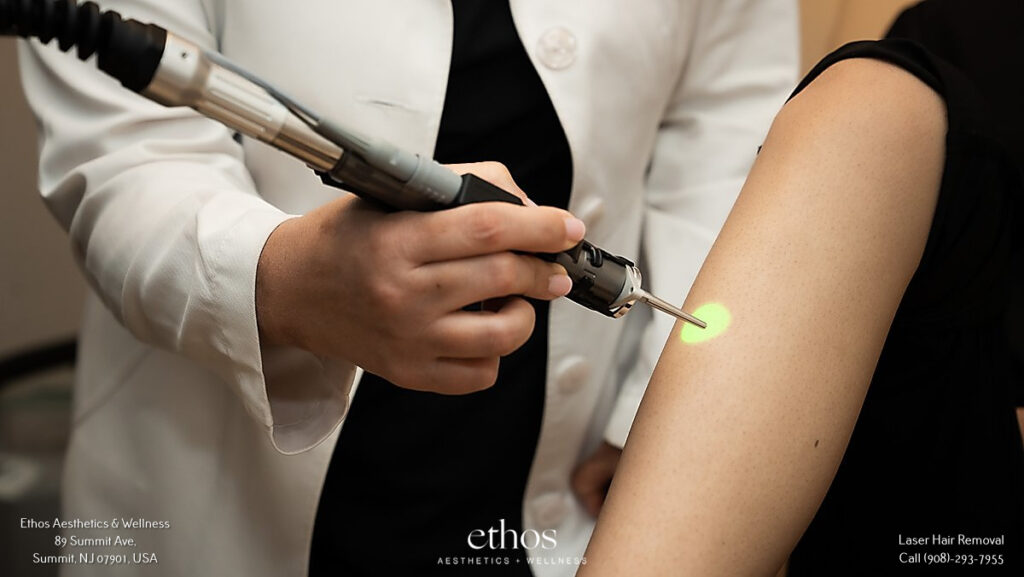
As NJ’s leading center for laser hair removal, Ethos Aesthetics + Wellness is dedicated to helping our patients remove unwanted body hair safely and comfortably. For more information about our hair removal process, schedule a consultation with us.
Learn more: What Is Laser Beard Shaping?


